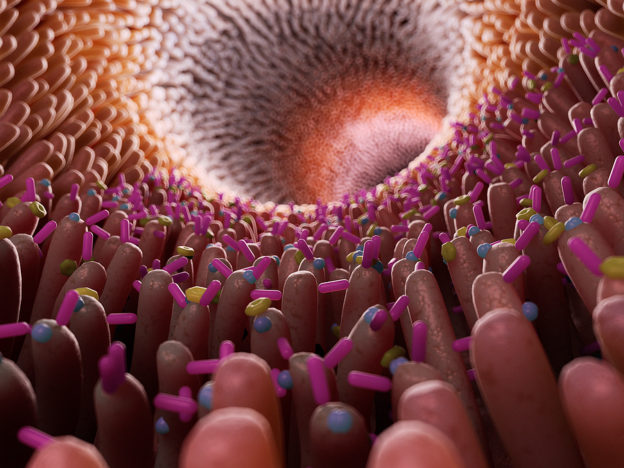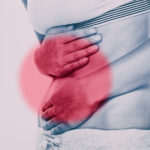By David Blyweiss, M.D., Advanced Natural Wellness
October 2, 2020
Did you ever get a “gut feeling” about something? Well, next time, you should trust that feeling.
That’s because your gut – or your intestinal tract – actually has a fascinating secret to share… it’s your second brain!
I know this sounds a bit crazy, but let me explain how it works. Imagine yourself as an embryo forming in your mother’s belly. You were just one or two weeks old.
The tissues of your brain began to branch out and form your intestinal tract. First the foregut formed, then the midgut, and finally the hindgut.
Over the weeks of your mother’s pregnancy, these tissues all specialized and developed. Still, that original connection between your brain and your gut never broke. It’s connected by the vagus nerve.
Your gut has hundreds of trillions of microbes living inside. Then, these microbes have hundreds of times more genes inside than our own human genome. All of these genes within your gut are known as your microbiome.[1]
This microbiome can change a great deal throughout your lifetime.[2] The foods you eat will determine whether your gut is filled with “good” or “bad” bacteria.
Open your arteries, improve blood flow for a new health miracle...
Did you know your circulatory system has over 60,000 miles of arteries, veins and other blood vessels, if stretched end to end?
But as you age, your blood vessels undergo changes, which may cause them to stiffen, thicken and get clogged.
GOOD NEWS! Doctors have now identified a “Miracle Molecule” inside your arteries that helps OPEN your arteries and IMPROVE blood flow.
It’s what Dr. Valentin Fuster calls it, "One of the most important discoveries in the history of cardiovascular medicine."To you, that means...
- Healthy blood pressure
- Sharper mind and memory
- Skyrocketing energy and muscular strength
- Increased pleasure and passion in the bedroom
- Improved circulation to every cell and organ in your body
Go here to discover a new natural way to significantly boost the levels of this miracle molecule in YOUR body NOW!
As a young child, your brain’s cognitive functions and abilities depended on a healthy gut. Certain health challenges – like a C-section birth, formula feeding, or a nasty round of antibiotics – served to stall your cognitive development.
Today, as an adult, you have more neurons in your intestine than you do in your entire spinal cord. If you can understand this relationship, you’ll be able to make better choices to keep your brain operating as it should.
Gut health impacts your brain health. So what happens in your gut can influence cognitive function, anxiety, depression and other physical functions.
Lessons Learned from the Gut-Brain Connection
Many doctors have either forgotten about this connection, or they never truly appreciated it in the first place.
Your gut has its own nervous system and its own immune system. It also makes and has receptors for neurotransmitters. In fact, the bacteria in your gut can influence your behaviors.[3]
For example, one of the main products of your gut bacteria are short-chain fatty acids like butyric acid. These acids help stimulate your sympathetic nervous system, release serotonin and influence your memory and learning processes.[4]
Information is constantly being sent from the gut to the brain and back again. But the flow of traffic is not balanced. There are eight times more signals coming from the gut to the brain.
Why is this important?
Well, 90% of the serotonin that your brain needs is actually made in your intestine. So, next time you think you have a “gut feeling,” you should listen to it! Your gut is quite literally sending information to your brain.
The World's Quickest Solution for Ending Prostate and Urinary Misery
This has recently been revealed to be one of the only real breakthroughs in prostate health.
The seeds of a strange fruit (sometimes called "Chinese Apples") hold powerful phytonutrients that are a revolution in prostate health.
In fact, UCLA and Veterans Administration research have now proved this to be true.
Not only that, but it may be the worlds quickest solution for ending prostate misery.
Simply stated, these phytonutrients represent a huge step beyond beta sitosterol, saw palmetto, and other phytosterols alone.
Simply click HERE if you want to have fast prostate relief...restful, uninterrupted sleep...no more constant "urges to go"...enhanced virility...and optimal prostate support for life.
The signals go the other way too. Messages from the gut can influence brain function.[5]
Just think about someone who is mentally stressed about a large presentation or test. The worry completely overwhelms them and before you know it, they’re running to the bathroom.
Or, ask any medical student about this. Look at a Navy SEAL who experiences a sour gut because of his extreme training. In this instance, the brain is signally problems to the gut.
We also know if you have a traumatic brain injury, within six days, your gut microbiome changes. The stress signals from the brain will kill off your microbiome.
The stress we undergo, the food we eat, and the bugs in our gut are major factors that shape the health of our microbiome.
5 Ways to Strengthen Your Gut Health for a Healthier Brain Too
If you take good care of the microbiome in your gut, it will help take care of your brain. In fact, if you do the right things for your gut, you’ll have a decreased chance of being depressed or anxious.
I have had patients come in who are feeling stressed and overworked. They’re just not happy. After a bit of probing, they also admit that they are constipated. This is not a coincidence.
A 2015 study found that people who were fed certain strains of bacteria improved their mood over a four week period.[6] The right bacterial population in your gut can also help with depression and anxiety.[7]
Issues with the gut can be a warning sign that brain problems are on their way. Chronic constipation can be a signal that Parkinson’s disease is ready to descend in 20-30 years.[8]
I tell these patients to change their diets. Then, I’ll get a phone call a few days later. They say, “I can’t believe it! I’m pooping three times a day! I’m working better, sleeping better, and I am just happier all around!”
Almost all of the people I help with diet changes notice this. Healthier foods work on every part of the body – including the brain. Here are a few pieces of advice to keep your gut (and brain) healthy:
- Eat 85% organic plant-based foods from all colors of the rainbow. This will help the bacteria that make the neurotransmitters that help your brain.
- Avoid antibiotics unless they are absolutely necessary. They decimate certain populations of bacteria. This can change the balance of your immune system and decrease vitamin B production.
- Feed your microbiome probiotics and then feed your probiotics with prebiotics.
- Don’t eat conventionally raised meats and other animal products. These animals are dosed with antibiotics so the drugs will pass along to you. Instead, opt for organic grass-fed animal products.
- Stay away from processed foods. The excessive sugars combined with “dead nutrients” will feed bad bacteria in your gut.
- Avoid things like chlorinated and fluoridated water, antibacterial soap and agricultural chemicals.
If you have chronic issues, you can change your life by changing what you put in your mouth.
I’ve said it before, but I’ll say it again. The most important toolkit to change your health – mental as well as physical – is what’s on the end of your fork and not at the bottom of a pill bottle.
Sources:
[1] Backhed F, Ley RE, Sonnenburg JL, Peterson DA, Gordon JI, (2005) Host-bacterial mutualism in the human intestine. Science 307:1915–1920.
[2] Turnbaugh PJ, et al. (2007) The human microbiome project. Nature 449:804–810
[3] Lyte M (2013) Microbial Endocrinology in the Microbiome-Gut-Brain Axis: How Bacterial Production and Utilization of Neurochemicals Influence Behavior. PLoS Pathog 9(11): e1003726. https://doi.org/10.1371/journal.ppat.1003726
[4] Ikuo Kimura, Daisuke Inoue, Takeshi Maeda, Takafumi Hara, Atsuhiko Ichimura, Satoshi Miyauchi, Makio Kobayashi, Akira Hirasawa, Gozoh Tsujimoto, Short-chain fatty acids and ketones directly regulate sympathetic nervous system via G protein-coupled receptor 41 (GPR41), Proceedings of the National Academy of Sciences May 2011, 108 (19) 8030-8035; DOI: 10.1073/pnas.1016088108
[5] Grenham, Sue et al. “Brain-gut-microbe communication in health and disease.” Frontiers in physiology vol. 2 94. 7 Dec. 2011, doi:10.3389/fphys.2011.00094
[6] Steenbergen L, Sellaro R, van Hemert S, Bosch JA, Colzato LS. A randomized controlled trial to test the effect of multispecies probiotics on cognitive reactivity to sad mood. Brain Behav Immun. 2015;48:258-264. doi:10.1016/j.bbi.2015.04.003
[7] Bravo JA, Forsythe P, Chew MV, et al. Ingestion of Lactobacillus strain regulates emotional behavior and central GABA receptor expression in a mouse via the vagus nerve. Proc Natl Acad Sci U S A. 2011;108(38):16050-16055. doi:10.1073/pnas.1102999108
[8] FabrizioStocchiMargheritaTorti, Chapter Twenty-Seven – Constipation in Parkinson’s Disease, International Review of Neurobiology, Volume 134, 2017, Pages 811-826, Available Online: https://www.sciencedirect.com/science/article/pii/S0074774217300971







